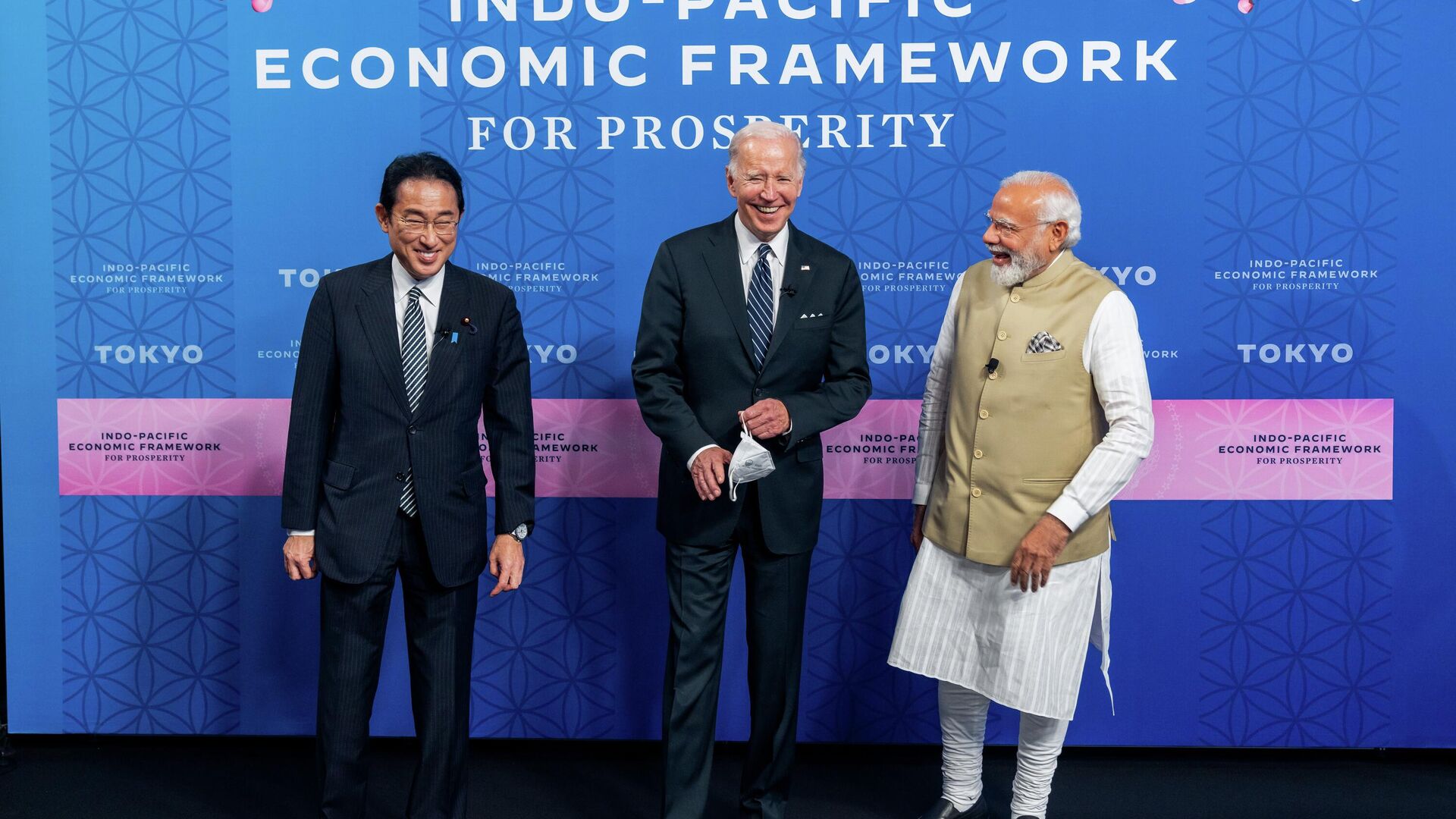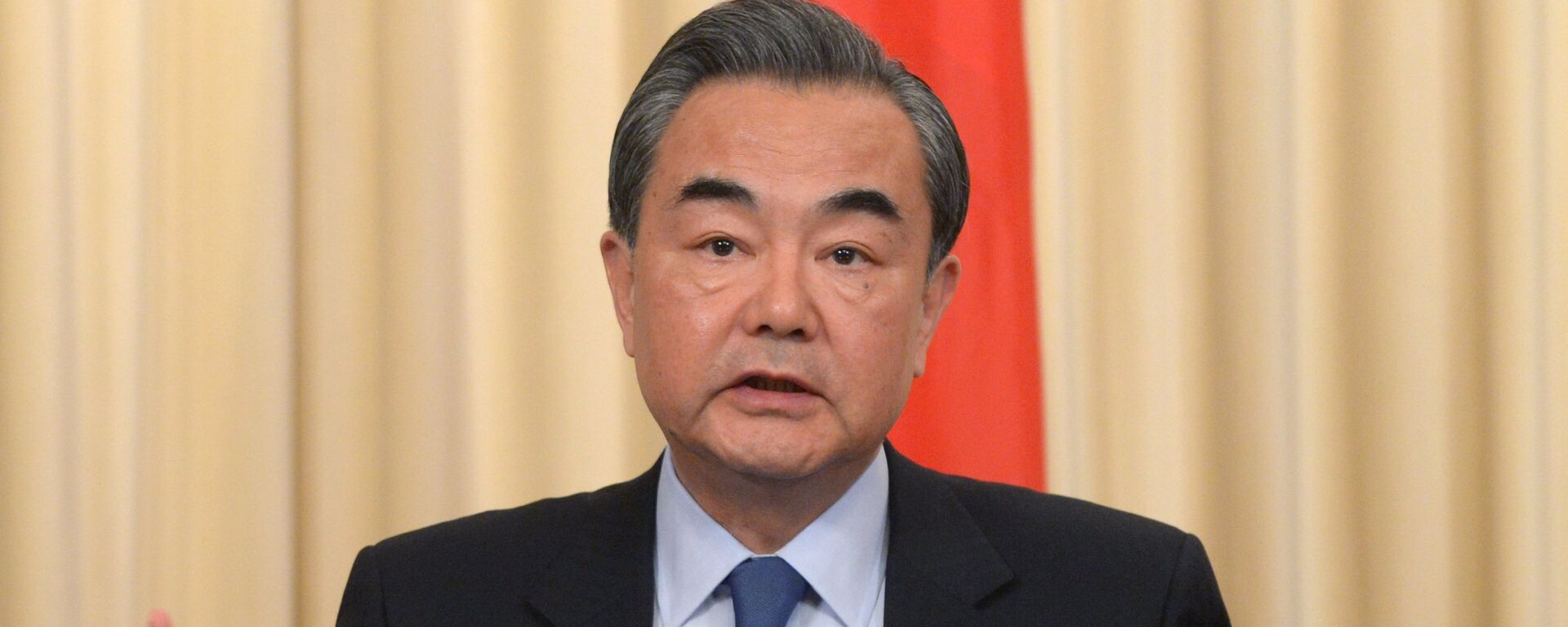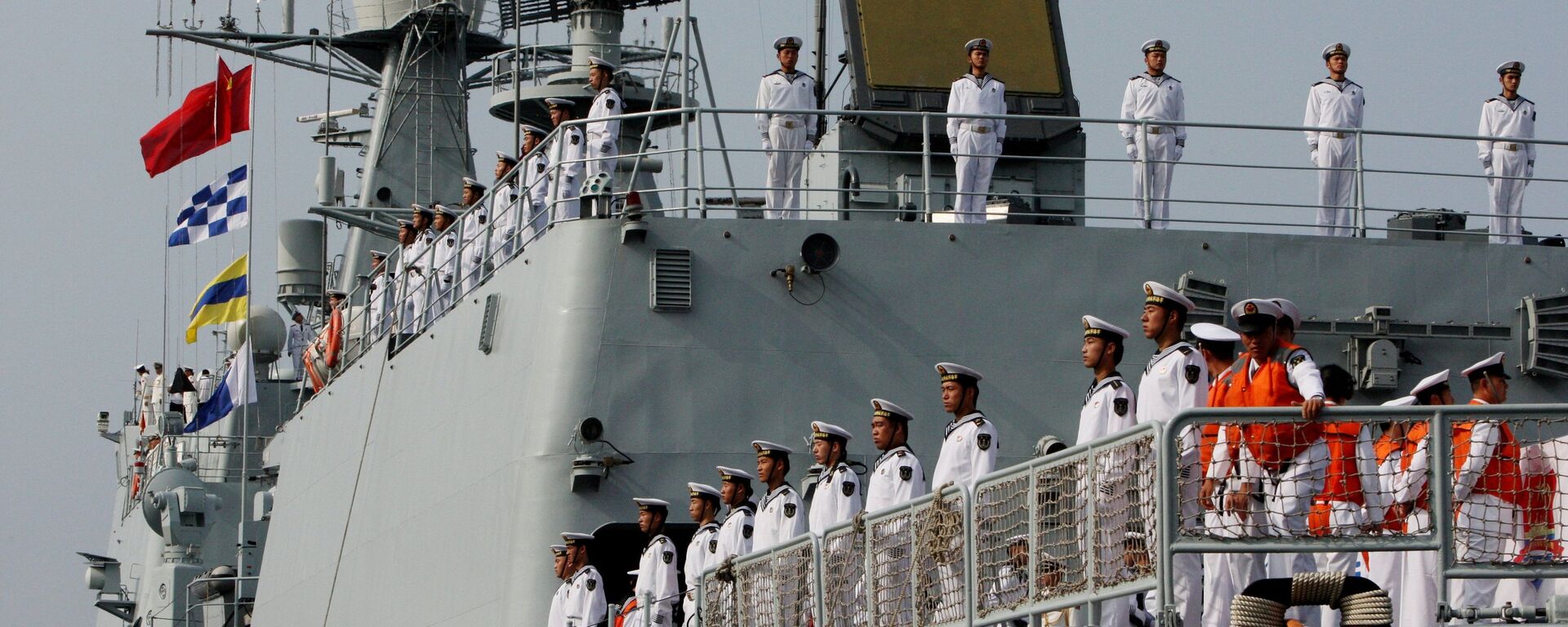https://sputnikglobe.com/20220526/us-makes-cautious-move-to-keep-taiwan-out-of-indo-pacific-economic-framework-professor-says-1095796950.html
US Makes Cautious Move to Keep Taiwan Out of Indo-Pacific Economic Framework, Professor Says
US Makes Cautious Move to Keep Taiwan Out of Indo-Pacific Economic Framework, Professor Says
Sputnik International
US President Joe Biden on Monday unveiled the Indo-Pacific Economic Framework (IPEF), an economic bloc that is widely believed to be an anti-China alliance... 26.05.2022, Sputnik International
2022-05-26T16:06+0000
2022-05-26T16:06+0000
2023-06-19T12:43+0000
china
us
quadrilateral security dialogue (quad)
indo-pacific
trans-pacific partnership (tpp)
asean
investor
joe biden
taiwan
https://cdn1.img.sputnikglobe.com/img/07e6/05/1a/1095795749_0:156:3001:1844_1920x0_80_0_0_1ea5a24111744bf53b6ec229f0a7caca.jpg
Sputnik: What is your first impression of the IPEF, given that 11 of the 13 members are part of the Regional Comprehensive Economic Partnership (RCEP) and seven are from the Comprehensive and Progressive Agreement for Trans-Pacific Partnership (CPTPP)?Prof. Harsh V. Pant: The US has attempted to fill a void in the economic sphere in the Indo-Pacific by unveiling the Indo-Pacific Economic Framework, or IPEF. America was criticised for not having an economic strategy for the region, especially after the Trump administration withdrew from the Trans-Pacific Partnership. Here they are coming with a framework, not a trade pact, keeping it flexible and ensuring that this is not about tariff reduction or tariff rationalisation. Rather, it is about trying to set a standard for digital economy, supply chains, and infrastructure connectivity initiatives. So at the moment, it remains to be seen how effective it will be. But, certainly it is an innovative idea in theory and the Americans are trying to respond to the challenge that the Biden administration faces, both back at home where there are dissenting voices on big trade agreements like the Trans-Pacific Partnership and demands from the Indo-Pacific region, where many countries want America to be a more robust economic player in the region.Sputnik: Indonesia urges IPEF members to refrain from turning the alliance into a tool to contain other regional players. How do you assess these remarks on the day of the launch of the IPEF?Prof. Harsh V. Pant: For ASEAN and Indonesia, it is essential to keep underscoring the central role of ASEAN, because ASEAN is at the heart of the discussions when global powers talk about coercion-free trade and investment in the Indo-Pacific region.So it is not very surprising that they are emphasising ASEAN's role. Of course, they do not want a great power confrontation that may restrict their space to manoeuvre between China and the US, as Southeast Asian countries have good relations with both the powers.If the US and China engage in this strategic contest, if it gets sharpened, then these will be the biggest challenges faced by ASEAN countries. So, I think they are just trying to avoid the possibility and they are trying to ensure that their voices are heard by the US and other IPEF partners.Sputnik: What's the upside for India, as it has a free trade agreement with ASEAN, bilateral trade agreements with Australia and Japan, and is in discussions with the US?Prof. Harsh V. Pant: India's upside is that India will be part of the founding members of the Indo-Pacific Economic Framework. India will be part of the group that will likely set the economic agenda for this region, and that is likely to create high-standard approaches across the range of issues, whether its trade, investment, supply chains, digital economy, etc. Now, India, of course, is also trying to ensure that it is a credible economic player in the region. It is now trying to improve upon its record with the signing of free trade agreements with a range of countries, as a recent one with the UAE, with whom a comprehensive economic pact has been signed. But also early harvest agreements or mini-trade deals with countries like Australia and talks of early harvest deals (mini-trade deals) with the UK, the EU, and the US. So, I think there is a sense in New Delhi that India needs to get its economic act together in the Indo-Pacific, and as a member of the IPEF, it gets to set the agenda, gets to set the standard, and become part of the conversation from which India has been absent.Sputnik: There is a lot of talk about resilient supply chains. Is it possible for the Biden administration to ask American companies to move their supply chain from China to ASEAN countries? Will India benefit from this?Prof. Harsh V. Pant: A resilient supply chain (that can avoid any disruption of raw materials) is central to any future economic architecture. What is very important today is the element of trust in economic engagements. The Biden administration is certainly asking American companies to reduce their dependency on China to bring back manufacturing to the US and move supply chains to other countries in South Asia.So, some of that movement has already started, but certainly, it is not a very easy decision for the private sector. But a country like India can benefit if it can provide incentives and infrastructure to firms in line with what is available elsewhere, particularly in China. So I think New Delhi is trying very hard to entice global companies to shift their manufacturing base to India.I believe the intent is there, and certainly, the debate on globalisation, which is now about trade and economic engagement among like-minded countries, is going to be sharper and that would increase the space for countries like India.Sputnik: Taiwan, a strong economic player in the Indo-Pacific region is not part of the IPEF. What does that imply?Prof. Harsh V. Pant: It basically implies that the US does not want to aggravate tensions with China when differences are growing and when there are lots of concerns across the world about the possibility of a conflict over Taiwan. So, certainly, not having Taiwan as part of this economic framework is an attempt by the US to be a bit more cautious, although I think the statement by President Biden in Japan has cast a shadow over it, and certainly, the reactions of the Chinese are quite visible. But I think the idea that the US should keep Taiwan out of this initiative is an attempt to make it possible for countries, like some Southeast Asian countries, to join this economic framework. Because if the IPEF would have become part of this US-China contestation, which it would have become if Taiwan were part of it, then many other countries would not have joined it.
https://sputnikglobe.com/20220522/chinese-top-diplomat-says-us-indo-pacific-strategy-undermines-peace-bound-to-fail-1095704253.html
https://sputnikglobe.com/20220524/bidens-strategic-confusion-why-china-wont-fall-into-us-traps-in-taiwan--indo-pacific-1095743592.html
china
indo-pacific
taiwan
Sputnik International
feedback@sputniknews.com
+74956456601
MIA „Rosiya Segodnya“
2022
Rishikesh Kumar
https://cdn1.img.sputnikglobe.com/img/07e4/08/04/1080055820_0:0:388:389_100x100_80_0_0_40018ee210946d65d49ffba4f4c008e1.jpg
Rishikesh Kumar
https://cdn1.img.sputnikglobe.com/img/07e4/08/04/1080055820_0:0:388:389_100x100_80_0_0_40018ee210946d65d49ffba4f4c008e1.jpg
News
en_EN
Sputnik International
feedback@sputniknews.com
+74956456601
MIA „Rosiya Segodnya“
Sputnik International
feedback@sputniknews.com
+74956456601
MIA „Rosiya Segodnya“
Rishikesh Kumar
https://cdn1.img.sputnikglobe.com/img/07e4/08/04/1080055820_0:0:388:389_100x100_80_0_0_40018ee210946d65d49ffba4f4c008e1.jpg
china, us, quadrilateral security dialogue (quad), indo-pacific, trans-pacific partnership (tpp), asean, investor, joe biden, taiwan
china, us, quadrilateral security dialogue (quad), indo-pacific, trans-pacific partnership (tpp), asean, investor, joe biden, taiwan
US Makes Cautious Move to Keep Taiwan Out of Indo-Pacific Economic Framework, Professor Says
16:06 GMT 26.05.2022 (Updated: 12:43 GMT 19.06.2023) US President Joe Biden on Monday unveiled the Indo-Pacific Economic Framework (IPEF), an economic bloc that is widely believed to be an anti-China alliance. Professor Harsh V. Pant, vice president of studies and foreign policy at the New Delhi-based Observer Research Foundation, sat down with Sputnik to talk about the creation of the bloc.
Sputnik: What is your first impression of the IPEF, given that 11 of the 13 members are part of the Regional Comprehensive Economic Partnership (RCEP) and seven are from the Comprehensive and Progressive Agreement for Trans-Pacific Partnership (CPTPP)?
Prof. Harsh V. Pant: The US has attempted to fill a void in the economic sphere in the Indo-Pacific by unveiling the Indo-Pacific Economic Framework, or IPEF. America was criticised for not having an economic strategy for the region, especially after the Trump administration withdrew from the
Trans-Pacific Partnership. Here they are coming with a framework, not a trade pact, keeping it flexible and ensuring that this is not about tariff reduction or tariff rationalisation. Rather, it is about trying to set a standard for digital economy, supply chains, and infrastructure connectivity initiatives. So at the moment, it remains to be seen how effective it will be.
But, certainly it is an innovative idea in theory and the Americans are trying to respond to the challenge that the Biden administration faces, both back at home where there are dissenting voices on big trade agreements like the Trans-Pacific Partnership and demands from the Indo-Pacific region, where many countries want America to be a more robust economic player in the region.
Sputnik: Indonesia urges IPEF members to refrain from turning the alliance into a tool to contain other regional players. How do you assess these remarks on the day of the launch of the IPEF?
Prof. Harsh V. Pant: For
ASEAN and Indonesia, it is essential to keep underscoring the central role of ASEAN, because ASEAN is at the heart of the discussions when global powers talk about coercion-free trade and investment in the Indo-Pacific region.
So it is not very surprising that they are emphasising ASEAN's role. Of course, they do not want a great power confrontation that may restrict their space to manoeuvre between China and the US, as Southeast Asian countries have good relations with both the powers.
If the US and China engage in this strategic contest, if it gets sharpened, then these will be the biggest challenges faced by ASEAN countries.
So, I think they are just trying to avoid the possibility and they are trying to ensure that their voices are heard by the US and other IPEF partners.
Sputnik: What's the upside for India, as it has a free trade agreement with ASEAN, bilateral trade agreements with Australia and Japan, and is in discussions with the US?
Prof. Harsh V. Pant: India's upside is that India will be part of the founding members of the Indo-Pacific Economic Framework. India will be part of the group that will likely set the economic agenda for this region, and that is likely to create high-standard approaches across the range of issues, whether its trade, investment, supply chains, digital economy, etc.
Now, India, of course, is also trying to ensure that it is a
credible economic player in the region. It is now trying to improve upon its record with the signing of free trade agreements with a range of countries, as a recent one with the UAE, with whom a comprehensive economic pact has been signed. But also early harvest agreements or mini-trade deals with countries like Australia and talks of early harvest deals (mini-trade deals) with the UK, the EU, and the US.
So, I think there is a sense in New Delhi that India needs to get its economic act together in the Indo-Pacific, and as a member of the IPEF, it gets to set the agenda, gets to set the standard, and become part of the conversation from which India has been absent.
Sputnik: There is a lot of talk about resilient supply chains. Is it possible for the Biden administration to ask American companies to move their supply chain from China to ASEAN countries? Will India benefit from this?
Prof. Harsh V. Pant: A resilient supply chain (that can avoid any disruption of raw materials) is central to any future economic architecture. What is very important today is the element of trust in economic engagements. The Biden administration is certainly asking American companies to reduce their dependency on China to bring back manufacturing to the US and move supply chains to other countries in South Asia.
So, some of that movement has already started, but certainly, it is not a very easy decision for the private sector. But a country like India can benefit if it can provide incentives and infrastructure to firms in line with what is available elsewhere, particularly in China. So I think New Delhi is trying very hard to entice global companies to shift their manufacturing base to India.
I believe the intent is there, and certainly, the debate on globalisation, which is now about trade and economic engagement among like-minded countries, is going to be sharper and that would increase the space for countries like India.
Sputnik: Taiwan, a strong economic player in the Indo-Pacific region is not part of the IPEF. What does that imply?
Prof. Harsh V. Pant: It basically implies that the US does not want to
aggravate tensions with China when differences are growing and when there are lots of concerns across the world about the possibility of a conflict over Taiwan. So, certainly, not having Taiwan as part of this economic framework is an attempt by the US to be a bit more cautious, although I think the statement by President Biden in Japan has cast a shadow over it, and certainly, the reactions of the Chinese are quite visible.
But I think the idea that the US should keep Taiwan out of this initiative is an attempt to make it possible for countries, like some Southeast Asian countries, to join this economic framework. Because if the IPEF would have become part of this US-China contestation, which it would have become if Taiwan were part of it, then many other countries would not have joined it.






